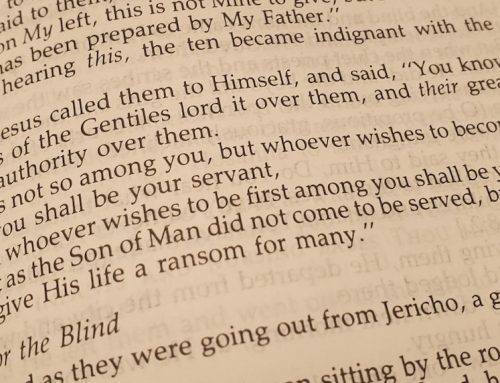The Bible is feared reading for some. If you were raised in the Stanton sect, it may seem to you like a mass of confusing cross references, chain references, commands, and vague inferences. Remember the trusty Thompson Chain Reference Bible? Yeah, I thought so.
Understanding how to read the Bible is critical to developing a love for the Word. It’s not as confusing as Stanton would make it seem. It’s actually exciting, if you take the clean Bible challenge. But it’s important not to read it like a novel. It’s not one. And it’s also not a law book to be dissected and argued like in the Pharisaic courtroom of May Week deliberations, either.
Here’s the simple truth: The Bible is basically a collection of short, real-life stories, along with some poetry, books of wisdom, prophecy, and even personal letters. All of these different pieces of literature are about 2000 years old or more, but have been preserved for us to read today. There is no other single book in the entire world that is anything like the Bible.
The Bible was written by the hands of many different human authors under the supervision of God Himself over the course of thousands of years. What is fascinating about the Bible is that in spite of its many different authors, there are no factual errors of history or science, and there is a clear theme that holds it all together. From the opening words of Genesis to the end of Revelation, that theme is Jesus Christ.
Here’s a quick synopsis that will make your reading of the Bible much more meaningful.
The old testament scriptures
The Old Testament tells the story of the beginning of the world and of human history through the eyes of God’s people, called the Children of Israel. It is through this civilization that Jesus Christ would eventually come. The word “testament” means “agreement” or “covenant;” the “old covenant” was a kind of contractual agreement between Abraham and God that the world would be blessed with the coming king (Jesus) through Abraham’s descendants. In the old covenant scriptures (what people call the Old Testament) we see the rise and fall of the ancient nation of Israel, with many prophecies (predictions) about a future Messiah (anointed king) who would rescue the people of Israel from the troubles they were having.
The Old Testament is composed of ancient writings from thousands of years ago, and includes the following writings:
1. The books of Moses (Genesis, Exodus, Leviticus, Numbers, Deuteronomy)
These books tell the story of Creation, the flood of Noah’s time, the beginnings of the Israelite nation, and it’s period of slavery in ancient Egypt. They also tell about the Israelites’ miraculous escape from Egypt, and about the laws God gave to Moses for the Children of Israel to obey. Sometimes these five books are referred to as “the Law” or the “Pentateuch.”
2. The books of history (Joshua, Judges, Ruth, 1 and 2 Samuel, 1 and 2 Kings, 1 and 2 Chronicles, Ezra, Nehemiah, Esther)
These books contain true stories that are sometimes suspenseful, occasionally unsettling, but always meaningful to us today in that they show us the character of God and how He protects those who serve Him. The history of the rise and fall of the Hebrew nation is recorded faithfully—not just their triumphs, but their failures as well, which few other ancient civilizations wrote about themselves. We have the story of how they came to settle in the land of Canaan, which is now called Israel. We’re told about their periods of faithfulness to God, and the times they turned from Him. We’re also told about their “judges” (military deliverers) and kings, about the rise of their prosperous civilization under kings David and Solomon, and ultimately about their decline into captivity under Assyria (modern Iraq), Babylon (also modern Iraq) and Persia (modern Iran).
3. The books of wisdom and poetry (Job, Psalms, Proverbs, Ecclesiastes, Song of Solomon, Lamentations)
The book of Job is famous for its story of a man persecuted by Satan himself and how he personally dealt with those difficult times. Most of the Psalms were written by King David; the book is actually a collection of individual songs. Proverbs, Ecclesiastes, and Song of Solomon were largely written by King Solomon, who recorded both witty and wise observations about human nature, moral conduct, and life itself. Lamentations was written by Jeremiah the prophet in poem form, and is about his sadness at the destruction of Jerusalem, the City of David, when it was overtaken by Babylon.
4. The prophetic books (Isaiah, Jeremiah, Ezekiel, Daniel, Hosea, Joel, Amos, Obadiah, Jonah, Micah, Nahum, Habakkuk, Zephaniah, Haggai, Zechariah, Malachi)
These books contain both predictions about Israel’s history that would come to pass many years later, and passionate instruction to the backsliding nation to turn from its errors. Israel, like mankind in general, naturally moved away from God over time, and most of the prophets wrote their books specifically to encourage the people to go back to obeying God’s laws. The prophets wrote many things about the coming of the Messiah, Jesus Christ, that happen exactly as predicted.
The new testament scriptures
The new covenant scriptures, often called the New Testament, tell us about the arrival of the Messiah. The word “Christ” simply means “the anointed one,” since kings were often anointed with oil in the old days, and Christians look to Jesus as our spiritual “king.” The “new covenant” (or contract) fulfilled the terms of the old one (the Old Testament) and put in place a new one that would be in effect until the end of time. In the New Testament we find the history and teachings of Jesus Christ and of his earliest followers, called his apostles (or messengers).
The New Testament is composed of the following writings from the 1st century AD:
1. The “gospels” (Matthew, Mark, Luke, John)
These four books are called the gospels because they document the “good news” of Jesus’ life from beginning to end. The word “gospel” means “good news.” They tell the story of Jesus’ life, and eventual death on the cross, from four different perspectives; Matthew, a Jewish tax collector turned follower; Mark, a Jew with Roman training; Luke, a physician; and John, a close friend (and some people think a cousin) of Jesus.
2. True stories of the Apostles’ early evangelism (Acts)
This book is called the Acts of the Apostles because it is an historical account of what Jesus’ apostles (His hand-picked messengers) did to aid in establishing Christ’s church.
3. The Apostle Paul’s letters to various first-century churches (Romans, 1 and 2 Corinthians, Galatians, Ephesians, Philippians, Colossians, 1 and 2 Thessalonians)
These letters were generally written to instruct the young churches (groups of believers) in how to behave as Christians. They cover topics like morality, faith, immersion (baptism), salvation, living a godly life of service to others, and many, many more.
4. The Apostle Paul’s letters to various individuals (1 and 2 Timothy, Titus, Philemon)
These letters were written to the individuals after whom they are named, and contain valuable, God-breathed instruction directly from Paul to these men.
5. An open letter to 1st century Christians of Jewish descent (Hebrews)
Many of the Jewish people who converted to Christianity during the early years of the church had a deep understanding of the Old Testament. This open letter was written to reassure them in their faith in Christ, and remind them, based on many Old Testament references they would easily understand, how the Jewish religion fit into God’s plan for the Messiah.
6. Letters by various individuals to first-century churches (James, 1 and 2 Peter, 1, 2, and 3 John, Jude)
Like Paul’s letters to various churches, these letters (written by the authors after whom they are named) enjoyed wide circulation among first-century believers. Since they didn’t have the Internet or the printing press, the letters were hand copied and passed from church to church to provide centuries of encouragement and instruction for Christians.
7. Book of prophecy (Revelation)
This is often the first book people turn to when they start reading the New Testament, but the numerous conflicting opinions on its interpretation can make it the most confusing. It contains a prophetic revelation to seven churches of the first century, with many appropriate lessons for our churches today. The book goes on to give us a great picture of the place He has prepared for the righteous after judgment, and develops the theme of how God’s forces will be victorious over evil in the end.
WARNING
For the rest of your life, remember that men and women have added “helpful comments” to just about every edition of the Bible that has been printed. All of them, including the words in this introduction to the Bible, are written by fallible people! Never assume to be true what a church, book, preacher, pastor, friend, or teacher tells you about the Bible without finding out for yourself if it’s true. This rule should keep you searching the Bible for the rest of your life, because there is no end of people willing to tell you what they THINK about it. Instead, find out what it really says!
Enjoy the journey of discovering God and the true story of Jesus Christ. Remember, it’s not so much about the Bible itself—that can become an idol, just as any church can become an idol when it stands in the place of God. No, it’s about the Jesus the Bible tells us about.
This is what Jesus told the Pharisees:
John 5: 39 – You study the Scriptures diligently because you think that in them you have eternal life. These are the very Scriptures that testify about me, yet you refuse to come to me to have life. “I do not accept glory from human beings, but I know you. I know that you do not have the love of God in your hearts.”







Kevin, the clean Bible challenge has helped me so much. I cannot read/study the KJV without remembering how Stanton taught it.
We were taught that John 9:31 says that God does not hear the prayers of a sinner. And About James 2:17 we were taught that this is the proof in the Bible that it is a sin to miss a Bible study or personal work. They twist the scriptures just like the Jehovah Witness.
Yes, it would be funny if it weren't so sad. I say just read the various "books" (or letters) of the Bible in the context they were written. If it's the book of Acts, it was a historical record written by Luke to document the early activities of the apostles. If it's the book of Romans, it was a letter from Paul to the church at Rome to address some problems he'd heard about at that congregation. Understanding the context in which the various scriptures were written is absolutely necessary before we can understand how to apply them to us.… Read more »
Wonderful article Kevin! It amazed me, even while I was with the group, how little understanding ones had of the scriptures. For example, one of my teachers taught that Isaiah 59.1-2 was written to non-members. After class I went to her privately and shared with her that it was written to God's people of the time, the Jews. Isaiah was speaking to his own people. She was adamant that it was to non-members!I'm not saying that I understood then or understand all now, but I do understand who the writer was speaking to. And that is one of the things… Read more »
I agree with you, Kevin. That is how I would study the books is by keeping the scriptures in context with the text. When we went through the book of I Cor. I studied out why Paul said, "to the Greeks it is foolishness and to the Jews a stumbling block". At the time the letter was written Corinth was under the Greek control and they based all of their civilization on gaining knowledge in math, science, and astrology and the gospel was foolishness to them. For the longest time and even when TC came to Tacoma, in the early… Read more »
There are a lot of small misunderstandings that people have that come from misreading the Bible, or misremembering something they read or heard taught. This is normal, of course, because we're all human, trying to understand God's message for mankind based on different amounts of knowledge, maturity, life experience, etc. Stanton's claim to be the One True Church that is always led into all truth by the Holy Spirit (unlike all the other heathen churches) is their own undoing. When you start uncovering the breadth of Stanton's misinterpretations about the Bible, it simply puts the lie to this claim. With… Read more »
One source of misunderstanding is from the way the SCOC studies, that is topical rather than contextual. Teaching such as: women cannot wear pants with the zipper in the front because Deuteronomy 22:5 teaches not to wear clothes that pertaineth to the man. This is trying to hold to the old testament and the new testament and it does not work, either you are bound under the old law or the new law, never both. Not having the context of who the scripture applied to causes many false understandings and teachings. The forbidding to consume alcohol based upon PR 31:4… Read more »
I did a lot of studying in the book of Daniel and it mentions the defilement of the temple in a couple different places. Through studying this out and reading about history I learned that it happened twice. Once during the 400 silent years and the other time after Christ's ascension. I tried to share this at a fellowship and it got back to me to quit talking about stuff like this as if it were true that older brethren would have found it first. It seems that if you weren't any of the appointed hierarchy that you had no… Read more »
One of the first rules of any oppressive hierarchy is that you are not allowed to learn more than your superiors. If you do, you will show them up in front of their subjects and throw off the whole balance of power.
A great book to explain the behaviors of a totalist group is Terror, Love and brainwashing by Alexandra Stein copyright 2021. The book explains the step by step process of how people are recruited, isolated, then broke down and brainwashed into an obedient unto the death follower. Some of the psychological techniques mentioned are used in the SCOC but not all. All knowledge flows from the leader is one that is used. I remember having a discussion with another babe about the book of revelations and was harshly corrected for this but was baffled as to why because were we… Read more »
What I found out very quickly (like 1 month in ) is that no one likes to talk about the scriptures, not in bible class, not in fellowship, and not in private. I was told that the "teacher" (leader) was the only one to ask questions of or about the scriptures; and only the "teacher" was to answer questions. I was corrected several times before I understood that the only person allowed to discuss the scriptures was the teacher (because babes like to ask questions of anyone who will answer them and only the "teacher" was the one to guide… Read more »
I have my different complaints about the SCOChurches but I sure didn't find what anon 11:45 said to be true. We talked scriptures all the time, with teachers and with each other. In fact, this is what I do miss no longer being there.
Really? I have been to Sunday fellowships where nobody talks, everyone just sits and looks at their feet for the two hours and eats quietly. The level of emotional pressure put on the congregation by Dominick was unbearable, so many, were baptized and within weeks they were gone, not many can endure an angry preacher very long. I can remember discussions about Alexander Campbell, and other 1800's preachers, many stories about Merie, and many stories about the preacher himself and how many people loved him, and stories about what the definition of words were in the Greek lexicon, but not… Read more »
Yes, anon 11:33pm. For a very long time. I also found the fellowships were what you made them to be. If you wanted scriptures and bible all you had to do was bring it up and BOOM. But your indicating that DS was so oppressive everyone was too afraid to raise their eyes from off of their shoes. Pretty dark.
The Sunday fellowships I attended where usually dominated by one person at the fellowship. I did try and talk scriptures but was usually interrupted by the dominate member at the fellowship. I have been to fellowships where the two hours were dominated by the Penzoil driver talking about the virtues of 10-30 motor oil, or the two hours dominated by the USMC drill instructor talking about how many weapons systems he learned in the Marine corps, or the two hours were dominated by the woman from Portland who, it seemed, had prepared a lesson just for fellowship and everyone was… Read more »
Just want to clarify that the person you are referring to is not in prison. Yes he had a crappy childhood but he has tried to overcome all of that. He does have great bitterness and resentment towards the church and his childhood, but has not gone to prison. I don't know where you are getting your info from, but that is not him in prison. In fact I just recently spoke to him a month or two ago. Felt I needed to clarify that.
Thanks for the clarification. It's possible there are more than one person with that name.
On the Arizona dept of corrections website under inmate data search there is a man with the same name, similar birth date, and similar resemblence. His Father, the Penzoil truck driver was abusive to many people, not just his own family. I watched his father go after a four year old grandson of a native american woman who had been baptized out in Mesa. The four year old was standing between the bushes and the building at the Arizona center for the Blind and was scared to death by the loud, angry man yelling at him. The boy's mother was… Read more »
Mistaken identity, see below. I spoke to him.
As similar as it may be, it is NOT him. In fact he hasn't lived in AZ for years now. I grew up with him and consider him like a brother to me. I'm not trying to start an argument or any of the sort, I just feel it not nice to say those type of hurtful things towards another without knowing the real truth of it. It isn't nice to assume things about people. Just because he had a crappy upbringing, as most of us did that were raised in the church, doesn't mean we should assume that all… Read more »
For the record, I talked to the person in that post, and Anon 11:02, you are correct that it is not him. He's doing well in another state. I'll let him say more if he wishes (I sent him a link to this thread), but he's not really into things online and doesn't use Facebook. I'm deleting the comment with the inmade ID # to avoid confusion.